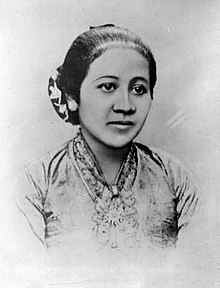Kartini
| Raden Adjeng Kartini | |
|---|---|

Portrait of Raden Adjeng Kartini (collection Tropenmuseum
|
|
| Born |
21 April 1879 Jepara, Central Java, Dutch East Indies |
| Died | 17 September 1904 (aged 25) Rembang, Central Java, Dutch East Indies (now Indonesia) |
| Other names | Raden Adjeng Kartini |
| Known for | Women's emancipation; national heroine |
| Spouse(s) | Raden Adipati Joyodiningrat |
Raden Adjeng Kartini (21 April 1879 – 17 September 1904), sometimes known as Raden Ayu Kartini, was a prominent Indonesian national heroine from Java. She was also a pioneer in the area of education for girls and women's rights for Indonesians.
Born into an aristocratic Javanese family in the Dutch East Indies, now Indonesia, she attended a Dutch language primary school. She aspired to further education but the option was unavailable to her and other girls in Javanese society. She came into contact with various officials and influential people including J.H. Abendanon, in charge of implementing the Dutch Ethical Policy.
Kartini wrote letters about her feelings and they were published in a Dutch magazine and later as: Out of Darkness to Light, Women's Life in the Village and Letters of a Javanese Princess. Her birthday is now celebrated as Kartini Day in Indonesia. She took an interest in mysticism and opposed polygamy. Her advocacy for the education of girls was continued by her sisters.Kartini Schools were named for her and a fund established in her name to fund the education of girls.
Kartini was born into an aristocratic Javanese family when Java was part of the Dutch colony of the Dutch East Indies. Kartini's father, Sosroningrat, became Regency Chief of Jepara. Kartini's father was originally the district chief of Mayong. Her mother, Ngasirah was the daughter of Madirono and a teacher of religion in Telukawur. She was his first wife but not the most important one. At this time, polygamy was a common practice among the nobility. She also wrote the Letters of a Javanese Princess. Colonial regulations required a Regency Chief to marry a member of the nobility. Since Ngasirah was not of sufficiently high nobility, her father married a second time to Woerjan (Moerjam), a direct descendant of the Raja of Madura. After this second marriage, Kartini's father was elevated to Regency Chief of Jepara, replacing his second wife's own father, Tjitrowikromo.
...
Wikipedia
